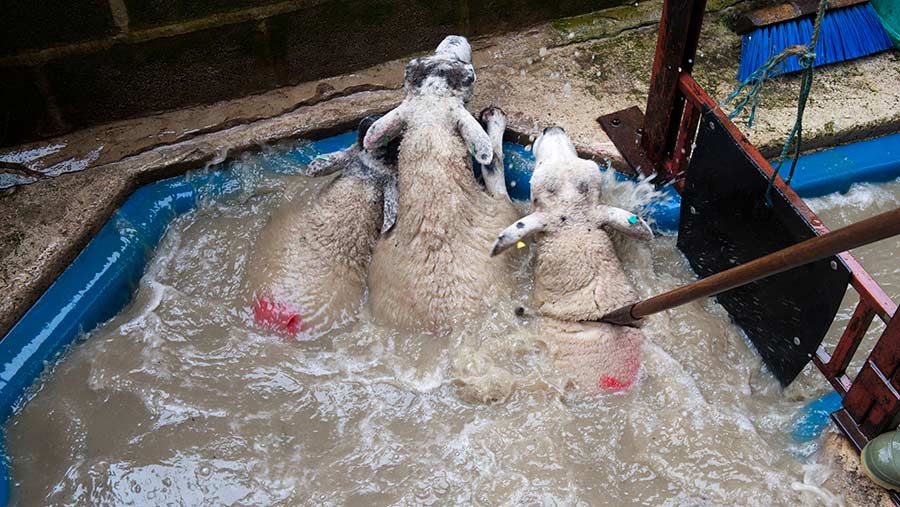Welsh farmers shocked by planned rises in environmental charges
 © Wayne Hutchinson/Alamy Stock Photo
© Wayne Hutchinson/Alamy Stock Photo Sheep farmers in Wales face a tenfold increase in the cost of an environmental permit to spread dip on their land from April 2023, as part of a massive hike in charges proposed by Natural Resources Wales (NRW) to plug a £3m annual shortfall in its finances.
In the first overhaul of charges since it was set up in 2013, NRW says it needs to charge £3,728 for every new application for spreading spent or unused sheep dip, instead of the £402 farmers currently pay.
For pig and poultry producers, there are substantial increases on the cards, too – an environmental permit to operate will cost £9,270, up from £7,322, while farmers who want to vary that permit would be charged £5,562, up from £388.
See also: Welsh government announces changes to NVZ rules
NRW is also proposing a 6% rise in the annual fee it charges farmers to monitor their compliance with permit conditions.
Crop irrigation would also become more expensive – the fee for a water abstraction licence would rise to £6,327 from the current price range of £135-£1,500.
And, there is currently no charge for a habitat risk assessment if proposed works could affect a protected feature, but a new charge of £917 would be introduced if NRW’s plans come to fruition.
NFU Cymru has described the proposed increases as “eye-watering”.
Financial impact
NRW does not deny that its charging proposals will have a financial impact on some businesses, but it insists they are needed because the taxpayer is currently meeting the cost of its budget shortfall.
It says the current scale of charges does not reflect the full cost of delivering its services – it reckons just 24% of those are met by users.
NRW’s head of regulation and permitting, Nadia De Longhi, said the new charges would reflect the “amount of regulatory effort” needed to consider each application.
“We have taken this step to review the charges we set for our regulatory services to ensure they are more closely linked to the actual cost of delivering these activities, and to ensure charge-payers, not the public, bear the expense,” she said.
“We appreciate the financial impact our charging proposals might have on some businesses, especially given the wider cost of living pressures.”
Cost recovery
Ms De Longhi said the body wanted to recover all of the costs of regulation and that the money would be reinvested in more compliance activity and pollution prevention.
The outcome, she added, would be a “fairer and more transparent charging system”.
But NFU Cymru said it would be seeking a full breakdown of costs from NRW to justify the scale of the increases and suggests that streamlining application processes and delivering efficiencies could help the organisation reduce its cost base.
It fears that the considerable increase in sheep dip disposal charges will hinder efforts to eradicate sheep scab.
NFU Cymru rural affairs board chairman Hedd Pugh said: “We want farming to continue to improve its environmental performance, but these cost increases could be seen as a disincentive to improve management practices, or limit the availability of diversification and management options for farmers in Wales in the future.”
The consultation will run for 12 weeks until 6 January 2023.
